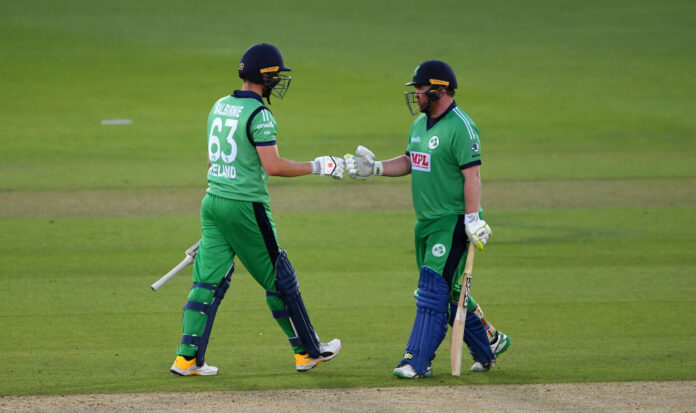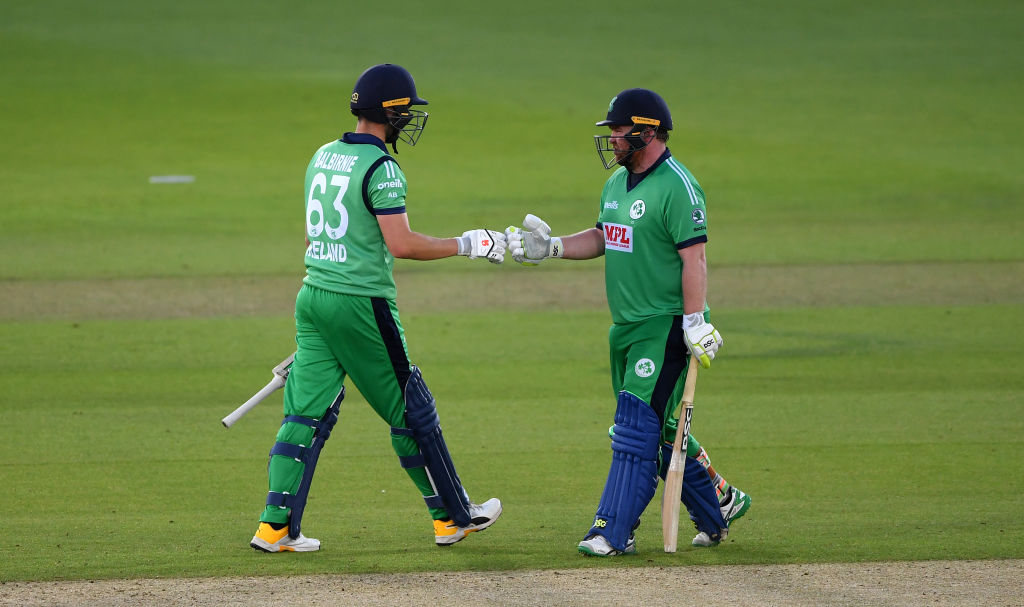

The Irish are quickly shedding their minnows tag after they posted yet another 300-plus total against an anxious New Zealand in the third One-Day International played in Dublin.
The Kiwis were made to sweat it out as defending a typically imposing 360 was not enough to deter Ireland from battling it out for an elusive maiden ODI win against them in an enthralling last ball thriller that left everyone on the edge of their seats.
After winning the toss and electing the bat New Zealand made a fiery start, with openers Martin Guptill and Finn Allen securing a 50-run partnership inside the first seven overs. Allen soon departed though after attempting one hook shot too many off Irish pacer Josh Little, holing out to the man stationed at long leg.
Will Young was also sent packing after a terrific run out off the arm of Curtis Campher, and suddenly New Zealand were looking a little shaky at two for 86 with Ireland growing in confidence on the field.
It was at this point where Guptill started to accelerate his scoring, and it wasn’t long before notched up his 18th One-Day International century at just under a run-a-ball. It was an important knock as it stabilised New Zealand’s wobbly scoring after the initial power-play and ensured that a 300-plus total was on the cards.
His departure in the 38th over saw some blitzkrieg batting from New Zealand’s lower order, as Tom Latham, Henry Nicholls, Glenn Phillips and Michael Bracewell all scored at 130-plus strike rates to boost the Kiwis to 360.
Henry Nicholls’ knock was particularly devastating as he smashed a damaging 79 off 54 balls which featured seven fours and three sixes, leaving Ireland’s beleaguered bowlers all leaking over five runs per over. New Zealand cashed in hard in the last ten overs, looting a whopping 106 runs.
Ireland’s run chase started in innocuous fashion as captain Andy Balbirnie was dismissed inside the first two overs for a five-ball duck, with many now thinking that they would not get within touching distance of New Zealand’s mammoth score.
The departure of Ireland number-three Andy McBrine also affirmed this notion, and although they had started to accelerate, the Irish were teetering at two for 62 inside the first ten overs.
A typical minnow cricket nation would have given up here, but not youngster Harry Tector and veteran Paul Stirling. The two combined to put on a gigantic 179 run partnership and showed absolute disrespect towards New Zealand’s established ODI bowlers. At this point many started to believe if the luck of Irish would soon prevail.
Tector and Stirling both scored commanding centuries and celebrated vociferously to an encouraging Irish crowd. For the second time in this short One-Day International series, New Zealand were made to feel the pressure and work hard to scrap their way back into the game.
And scrap they did. Stirling was dismissed in the 35th over after bludgeoning a Henry Nicholls short ball to Glenn Phillips at midwicket, and with that Ireland lost a further three wickets for just 37 runs giving New Zealand the opening they needed.
But Ireland continued to believe. Wickets and boundaries tangoed between the sides as Ireland continued to land punches on New Zealand despite their lower order being dismissed at regular intervals.
Chasing 360 no longer fazed Ireland, and in the last over they required just ten runs to secure one of the most famous victories in their cricket history.
Fast bowler Blair Tickner was the man selected to defend New Zealand in the final over. It would be one of the most heart-stopping overs he would ever bowl.
A vital drop off Glenn Phillips meant Ireland had a crucial boundary off the third ball, and even when Craig Young was run out with just two balls to go, Ireland still needed four runs to win.
Another desperate single from Josh Little off the fifth ball meant that Ireland needed just three runs to win from the final ball of the match. A boundary would do it.
But it wasn’t to be. The despair around the ground was palpable, as Graham Hume attempted a wild swing which never connected bat to ball, and the Irish could only manage one leg-bye as New Zealand pulled off one of the all-time great escapes in the white-ball game.
Such a narrow loss would only continue raise the profile of Ireland in a positive light, as it was apparent that they were continuing to improve and play a fearless brand of cricket against the top teams.





